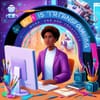Artificial intelligence is revolutionizing the way we work and create, bringing about a significant shift in productivity and innovation. By automating repetitive tasks, AI enables individuals and businesses to focus on higher-value activities like problem-solving, creativity, and innovation. This technology is not only enhancing efficiency but also fostering creativity, allowing humans to concentrate on strategic initiatives and meaningful roles.
AI is transforming the creative process by generating innovative ideas, drafting compelling content, and streamlining daily operations. It collaborates with humans, providing novel insights and handling ordinary tasks, which enables creatives to focus on high-level tasks and explore new approaches for self-expression. Moreover, AI tools are making creativity more accessible, allowing individuals without extensive artistic training to produce professional-grade content.
The impact of AI on creativity is multifaceted. AI-generated art, music, and writing are giving rise to new art forms, and tools like DALL·E, MidJourney, and Stable Diffusion are turning text prompts into stunning visuals. Additionally, AI is enhancing productivity, providing widespread access to expertise, and enabling small businesses and individuals in remote areas to compete on a global scale.
However, as AI continues to evolve, it's essential to address concerns around AI ethics, bias, and regulation to ensure that AI applications do not reinforce existing inequalities or compromise privacy. The future of creativity lies in collaboration between humans and AI, with AI handling routine tasks and providing novel insights.
By embracing AI and its potential, we can unlock new possibilities and achieve breakthroughs in various fields. As AI continues to shape the future of work and creativity, it's crucial to stay ahead of the curve and harness the power of AI to drive innovation and growth.


